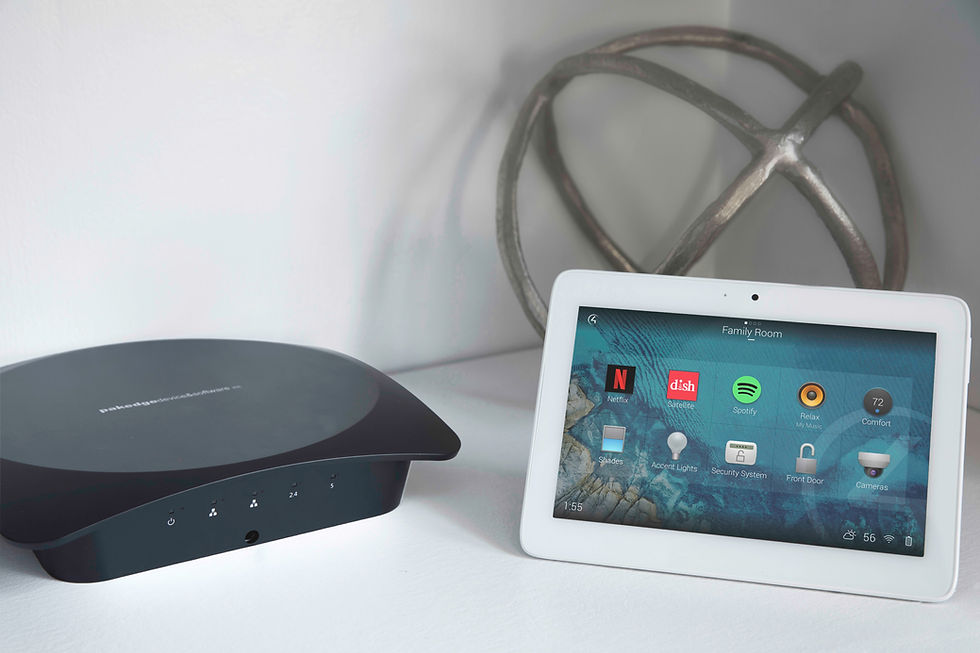The Critical Role of Smart Home Network Infrastructure in Enhancing Security and Efficiency
- Rob Marshall
- Sep 10, 2025
- 4 min read
In today's fast-paced world, smart homes have moved from a futuristic concept to a reality for many homeowners. With the increase in smart devices, there is a growing reliance on technology to improve daily living. However, the key to this technological revolution is a strong smart home network infrastructure. This post highlights the importance of a well-structured home network for both security and the efficient operation of smart devices.
Understanding Smart Home Network Infrastructure
A smart home network infrastructure comprises interconnected devices, routers, and communication protocols that enable smart devices to interact with one another and access the internet. This setup is essential for ensuring that devices like smart thermostats, security cameras, and lighting systems operate efficiently and securely.
A solid home network does more than facilitate communication. It also protects sensitive data from cyber threats. With approximately 50 billion devices connected to the internet by 2030, as reported by Statista, the chances of security breaches rise significantly, making a reliable network infrastructure more crucial than ever.
The Importance of Security in Smart Homes
With the widespread adoption of smart home technology, security has become a major concern. Cyber threats can compromise personal data, invade privacy, and even gain control over smart devices. A strategically designed home network can significantly reduce these risks.
Protecting Personal Data
Smart devices often gather personal information, such as usage patterns and preferences. If your home network lacks security, this data can be intercepted by hackers. For example, a recent study found that 70% of IoT devices are vulnerable to hacking. Implementing robust encryption protocols and consistently updating device firmware can help safeguard this data.
Preventing Unauthorized Access
A strong home network includes firewalls and complex passwords, preventing unauthorized access. By segmenting the network, homeowners can keep smart devices separate from personal computers, lowering the risk of a breach. For instance, keeping smart cameras on a different network from other devices can enhance your home's security.

Enhancing Efficiency and Performance
A well-structured home network is essential for the smooth operation of smart devices. It ensures uninterrupted communication, leading to a better user experience.
Seamless Device Communication
Smart devices rely on continuous communication to function properly. A strong Wi-Fi signal and low latency are vital for tasks such as streaming security camera footage or controlling the thermostat remotely. In fact, research shows that 60% of users experience connectivity issues due to weak signals. Strategically placing your router and using Wi-Fi extenders can help eliminate dead zones, ensuring consistent connectivity for all devices.
Managing Bandwidth
As your collection of smart devices grows, managing bandwidth becomes vital. These devices can consume significant data, especially during video streaming or updates. Prioritizing bandwidth for important devices, like security cameras or smart lights, can prevent slowdowns. For example, setting up Quality of Service (QoS) settings in your router can help allocate bandwidth efficiently, ensuring smooth operations.

The Role of Internet Security
In addition to a solid home network, internet security measures are essential for protecting your smart home. Homeowners should consider implementing the following strategies:
Regular Software Updates
Keeping all devices updated with the latest software is crucial for security. Many manufacturers frequently release updates to fix vulnerabilities. For instance, nearly 90% of IoT attacks exploit known vulnerabilities due to outdated software. Regularly checking for and installing these updates can significantly bolster your security.
Strong Passwords and Authentication
Using strong, unique passwords for each device and enabling two-factor authentication can greatly enhance your security. This practice makes it much harder for unauthorized users to gain access to your network.
Network Monitoring
Continually monitoring your home network for unusual activity can help identify potential threats. Many routers include built-in monitoring tools that can alert homeowners to suspicious behavior, such as abnormal data usage patterns.
Future-Proofing Your Smart Home
As technology continues to advance, so too will the capabilities of smart home devices. Future-proofing your home network is vital for keeping pace with new developments and maintaining security.
Scalability
When creating a smart home network, consider scalability. Choose devices and routers that can support future additions. This foresight can save time and resources as your network expands. For example, investing in a router that supports Wi-Fi 6 can accommodate more devices without sacrificing speed.
Compatibility
Make sure that all your devices are compatible with your chosen network. Selecting devices that meet common standards can simplify integration and improve performance. According to a report by Deloitte, 55% of consumers worry about device interoperability in their smart homes.
Building a Secure and Efficient Smart Home
In summary, a robust smart home network infrastructure is vital for enhancing both security and efficiency in contemporary homes. As smart devices become increasingly common, homeowners should prioritize the design and maintenance of their home networks. By employing strong security measures, ensuring seamless communication between devices, and planning for future needs, homeowners can fully enjoy the benefits of smart technology while protecting their personal data.
Investing in a dependable home network is not just about convenience; it's about creating a secure and efficient environment that adapts to the evolving technology landscape. Embrace the future of smart homes confidently, knowing that solid network infrastructure forms the foundation of your connected lifestyle.





Comments